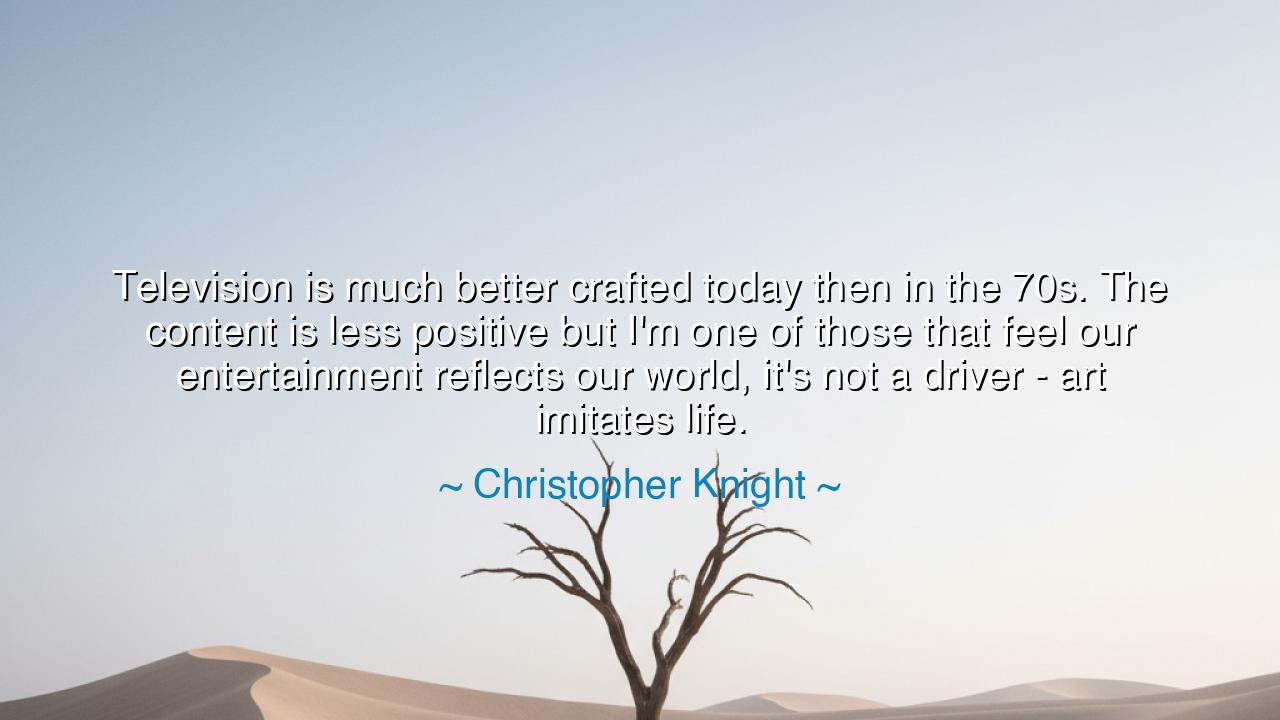
Television is much better crafted today then in the 70s. The
Television is much better crafted today then in the 70s. The content is less positive but I'm one of those that feel our entertainment reflects our world, it's not a driver - art imitates life.






Christopher Knight, once a child of the screen himself, spoke with the gravity of one who has seen generations pass before the glowing fire of images: “Television is much better crafted today than in the 70s. The content is less positive but I’m one of those that feel our entertainment reflects our world, it’s not a driver—art imitates life.” In this utterance, he draws back the veil and reveals a truth the ancients also knew—that the works of human hands, whether carved in stone, painted upon parchment, or broadcast upon the air, are mirrors of the age that creates them. Art, he declares, is not the master but the echo of life itself.
The days of the 1970s held a certain innocence upon the screen, tales woven with positivity, with bright families and easy laughter. Yet as the world grew darker, burdened by wars, divisions, and doubts, so too did its art become heavy with shadow. Thus Knight proclaims that we must not curse the entertainment of our time for being grim, but rather look to the world that birthed it. For a garden overrun with thorns will never yield roses, and a wounded world cannot be expected to sing only of joy.
Consider the story of the Greek tragedians. Aeschylus, Sophocles, and Euripides did not invent sorrow, nor conjure tragedy to sadden the people; they reflected the anguish of their age, when Athens was torn by war, betrayal, and decline. Their plays were mirrors, showing men and women their own brokenness so that they might understand it. Just as in those days the stage revealed the wounds of the city, so in our age the screen reflects the struggles of the modern world.
Knight’s words also carry a lesson of humility. If we wish to see brighter tales upon the stage or the screen, we must first heal the world that stands behind them. It is not the task of art alone to lift us from despair, but the task of humanity itself. When peace, justice, and love thrive, then art too will shine forth with light. The brush, the pen, the lens—all follow the soul of their time, like rivers follow the pull of the mountain.
Therefore, let us take this teaching to heart: do not curse the mirror for the face it shows. Instead, seek to change the face, and the mirror will follow. Art imitates life, as the sage Knight reminds us, and thus every generation writes its own theater. If we desire stories of hope, we must first plant hope in the soil of our days. For in the end, what the world is, the art will declare; and what the people become, the stories will forever remember.






LThuong luong trong
Knight’s comparison between the crafted quality of television today versus the 70s raises the question of whether increased sophistication in production makes the content any more meaningful. Does better quality equate to better storytelling, or are we sacrificing depth for visual appeal? And is the shift toward more negative themes a reflection of real-world issues or a trend in what audiences want to see?
MNMinh Nguyen
It’s fascinating that Christopher Knight believes entertainment mirrors reality rather than shaping it. How does this idea challenge our view of television as a powerful cultural influence? Are we passive consumers of media, or do we actively shape what we see on screen by reflecting the times we live in?
MANguyen Minh Anh
Knight’s comment that art imitates life resonates with me. If entertainment reflects our world, does that mean we, as a society, are less optimistic today than in the 70s? How does the tone of modern television influence our worldview, and is it possible that these darker portrayals could affect our mental health or outlook on the future?
TT34. Hoang Thu Tra
Christopher Knight’s point about how television has evolved over the years is interesting, but it makes me wonder – is the content really ‘less positive,’ or is it simply more complex and nuanced? How much of today’s entertainment reflects the challenges of the modern world, and is it a sign of progress or a sign that we’re growing more desensitized to negativity?